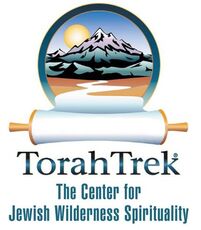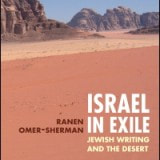|
If one had to choose the landscape that has most affected Judaism and the Jewish psyche, it would likely be the desert, where the Jewish people spent its formative years. Our guest contributor is former Israeli desert dweller and wilderness guide, Professor Ranen Omer-Sherman, author of Israel in Exile: Jewish Writing and the Desert. A CONVERSATION WITH RANEN OMER-SHERMAN
Rabbi Mike Comins interviews Professor Ranen Omer-Sherman on the cultural and spiritual influence of the desert on Jewish writing, and him! Ranen Omer-Sherman, author of Israel in Exile: Jewish Writing and the Desert, grew up in Los Angeles and made Aliyah to Israel in 1975 at the age of 17. He helped found Kibbutz Yahel, deep in the Israeli Arava desert, some 60 miles north of Eilat. For thirteen years, Ranen worked as a farmer and wilderness guide, leading teenagers from North America and the UK through Israel’s deserts. He returned to the United States in 1988 earning his MA and Ph.D. in English at the University of Notre Dame. Ranen has taught English and Jewish Studies at the University of Miami since 2002. His other books include Diaspora and Zionism in Jewish American Literature: Lazarus, Syrkin, Reznikoff, Roth; and two co-edited volumes, The Jewish Graphic Novel: Critical Approaches, and Narratives of Dissent: War in Contemporary Israeli Arts and Culture (forthcoming 2012). Mike Comins: Having lived the desert a long time, what would you say are the gifts of the desert? Ranen Omer-Sherman: Whether you are sojourning there for a long time, or you’re going there for a little while, it gets under your skin. It’s one of those landscapes that you take with you even when you go away from it. It’s a place that’s very restorative and rejuvenating. It demands a slowing down and a contemplation. Mike Comins: Did you have a personal practice of going out into the desert? Ranen Omer-Sherman: Oh yes, it was very, very important to me. Going out into wilderness allows you to put things into perspective. I frequently wandered in the areas around Yahel, in places where it felt like no one had been in many, many years. That kind of solitude was important to me. Eventually, when I took young people into the desert—the Sinai and Judean desert, the mountains of Eilat and the greater Negev—I was trying to get them to experience something that even in those days was really missing: an encounter with quiet, an encounter with a night sky without city lights. And in our own moment, where suddenly all of our lives are filled with so many devices and we’re all in a way ADD, moving frantically from one thing to another, the desert has an even more urgent and vital role to play in terms of just inviting personal reflection than it ever did before. I think that keeping a sound mental balance, and even understanding what a sound mental balance is, is becoming harder and harder for people. The austere quality of the desert gives the individual an ideal dreamscape for working through and reprioritizing and getting a better sense of what the self really is. Mike Comins: How is the desert different from other natural environments? Ranen Omer-Sherman: When you live in the desert there is a sense that time doesn’t quite exist the way it does elsewhere. As opposed to other natural environments—Edward Abbey writes about this—you have a sense of everything being in its place, the solitariness of things, the spacial rootedness of things, of individual things, but also the absolute connectivity between things and between peoples. You have this very austere, very demanding environment and because of that, I think it invites a very serious, very soul searching response. It might even invite other responses in other natural environments. You think more about interdependence. And in the context of Jewish thought, the desert defies any sense of national belonging, any sense of national containment. The desert is really trans-national space. As the midrash mentions, there is a reason the law was given in the desert—so that it could not be claimed by any one people. It was immediately, as it was given, universal. Mike Comins: Would you say that there is something “Jewish” about the desert? Or maybe the correct way to phrase this is, is there something “desert” about the Jewish People? Ranen Omer-Sherman: There’s a way in which the Jewish book itself is in conversation with the mystery of what happened in the wilderness. A wonderful writer that I like a lot, Edmond Jabès, says that the desert is the center of human beings’ greatest epiphanies and imaginative leaps. It’s the place where he says “the Jew is at the center of a vertiginous paradox…by inventing God he invented himself” (From The Desert to the Book). There is a radical questioning that is central to Jewish existence. Wilderness inspires it; the desert, I think, is its divine conduit. Jabès also writes, “maybe exodus and exile were indeed needed so that the word cut off from all words—and thus confronted with silence—can acquire its true dimension…just as we are truly ourselves only at the most arid core of our solitude” (From The Desert to the Book). So wandering for the Jew is very much a part of Jabès’ thought. For him and many other Jewish poets and writers, the Jews, even when they have been dispersed throughout the world, have always been in exile in relation to the place they were in before. And I think this is a mode of being that becomes intensely present in the desert. Israel in exile: Jewish writing and the desert
The Desert and the Jewish Imagination
Professor Ranen Omer-Sherman Excerpt from a talk on his book: Israel in Exile: Jewish Writing and the Desert In one section of my book, I discuss the works of Jewish writers in the diaspora and I find especially stirring Simone Zelitch’s audacious retelling of the Exodus. Zelitch’s midrashic rewriting of Exodus and Numbers in her harsh and earthyMoses in Sinai (2002) is an eclectic collage that juxtaposes mystical knowledge, ancient history, Oriental folk traditions, and even Marxism. Above all, it considers the paradox of how Moses leads the Hebrews out of Egypt, only to re-create a stratified society of conquerors. I’m intrigued that Zelitch once called her Moses in Sinai “a Last Temptation of Christ for Jews” (and Kazantzakis’s book is a sort of midrash for Christians). Perhaps by this she alludes to the ways her expansion aspires to fill in gaps about the spiritual yearnings and confusions of the leading characters, particularly the heretic villains who defy Moses and presumably God’s implacable will. She seems to have been very self-conscious about writing against the grain. Moses in Sinai probes the existential possibility of living without becoming masters or slaves, or without the “slaves” becoming the masters or oppressors. Especially striking is Zelitch’s recasting of Korah’s infamous rebellion in the wilderness as a revolutionary struggle to keep faith with nomadic ethics. If you’re not familiar with this figure he is one of the most infamous figures of Torah; the earth is said to have opened up and swallowed Korah as well as his followers when he challenged the authority of Moses and Aaron in the wilderness (Numbers 16:17). Interestingly, Zelitch has said that “I started thinking about the novel back in high school—a Jewish high school by the way—when a rabbi warned us not to be like the infamous Korah who led a rebellion against Moses.” In Zelitch’s novel, Korah’s subversive response to authority inaugurates a questioning of the master narrative of the original crisis which ensues in the coming out of Egypt in the Book of Exodus. A fellow conspirator, Dathan, yet another rebellious figure the Bible claims was swallowed up by the earth (Numbers 16:32), offers Moses a more explicit plea to justify his own heretical resistance. “Canaan means the end of everything. Once we have land we have owners, we have gold. We both know.” “What do we know?” Moses asked. He sounded tired. Dathan struck the tent post with his fist. “You know that if we have Canaan we’ll have Lords again. We’ll be like everyone else. We’ll have masters and slaves. You don’t want that.” Together with Korah, he embodies the egalitarian forces of outspoken dissent. For Dathan, the prophetic doom of “everything” that he vehemently protests against here means the destruction of nomadic ethics—the lived reality as practiced by the tribes in the desert, rather than legalistic abstraction. I’m fascinated by the fact that an unusual but respected current in biblical scholarship actually supports Zelitch’s challenging reading of the tensions embedded in the desert experience. In Harry Berger’s poetic rendering of this counter-tradition, he argues that: "The failure of the Mosaic revolution was built into the very premises it started from, and into the very conditions of its origin and triumph. A phantom double of the pharaoh, what the Egyptians would have called an akh, a vital force emanating from the tomb, traveled with the fugitive Israelites, stored its potency within their early image of Yahweh, and waited for the time when they would inevitably return to spiritual Egypt, not as slaves who had been betrayed or forced into captivity but as the captors and victors themselves." (Berger, Harry, Jr. “The Lie of the Land: Text Beyond Canaan.” Representations 25. Winter 1989: 119-38.) Berger sees “the seeds of Egypt” fatally germinating and “carried within…the Mosaic revolution…the royalist and antiroyalist trajectories are certainly present in the text, twining and untwining throughout.” Zelitch’s Moses in Sinai brings alive the vibrant impulse of this vital paradox for contemporary readers who she seems to feel may be unfamiliar with the competing strands embedded in their own spiritual traditions. What Dathan and Korah plead for is the preservation of nomadic ethics, the intensified understanding of human interdependence that the desert experience demands and bestows. Ranen Omer-Sherman, author of Israel in Exile: Jewish Writing and the Desert, grew up in Los Angeles and made Aliyah to Israel in 1975 at the age of 17. He helped found Kibbutz Yahel, deep in the Israeli Arava desert, some 60 miles north of Eilat. For thirteen years, Ranen worked as a farmer and wilderness guide, leading teenagers from North America and the UK through Israel’s deserts. He returned to the United States in 1988 earning his MA and Ph.D. in English at the University of Notre Dame. Ranen has taught English and Jewish Studies at the University of Miami since 2002. His other books include Diaspora and Zionism in Jewish American Literature: Lazarus, Syrkin, Reznikoff, Roth; and two co-edited volumes, The Jewish Graphic Novel: Critical Approaches, and Narratives of Dissent: War in Contemporary Israeli Arts and Culture (forthcoming 2012). Israel in Exile is available at University of Illinois Press Amazon Barnes and Noble
0 Comments
|
Welcome to the TorahTrek eJournal! Here you will find videos, interviews, articles, photos, and educational materials on the interconnections between Judaism, wilderness, spiritual practice and sustainability. Our goal is to support the spiritual/ethical lives of individuals, enliven and strengthen the Jewish community, and promote a sustainable society living in balance with the earth. Explore the eJournal by clicking on the topics below. Please share these resources with your friends! Topics
All
|


 RSS Feed
RSS Feed